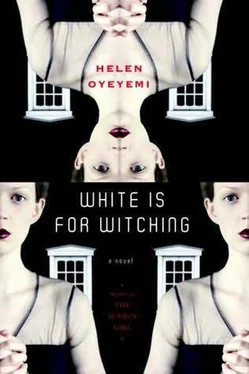She bit at the white side — she bit! In my distraction I lost hold of the other black guests, the couple on the second floor who I had kept in their bed the past three days, curved around the bed like fitted sheets with their faces crusting over. The African with the silent chest chewed, swallowed and opened her mouth for more, while the couple picked up their cases and fled, leaving money on the hallway desk as payment for their stay. Then, precise as ever, Luc Dufresne’s car pulled up outside, the car with my Miranda inside it, and there was nothing more to be done at that time.
The next day, the frock coat was the last thing Miranda took on her way out of her room; she pulled it off the mannequin, put it on and left for Cambridge.
On the first day of Freshers Week the sunlight turned the stone buildings silver. Dad got so baffled by the one-way system that we ended up parking, walking up to my college and borrowing a luggage trolley from a porter to wheel my suitcases up to my room. Mum kept dabbing her eyes with a handkerchief, but when I asked her what she was sniffling about she said, “Ore, I’m fine.” Each college we passed stood as taut and strong as a flexed arm and had its flag flying from a pennant. Both road and pavement were full of people on foot, laughing and calling out to each other. I thought it could be Camelot, or Lyonesse. I thought, I can’t live here. I was relieved when it finally got dark and the town became more anonymous. By then people had started sharing their A-level results, and when they had exhausted that topic, they started on their GCSEs. You could tell who’d gotten 5 A’s at A level because they’d ask the question, yet hold out on contributing their own answer until the last possible moment.
Everyone seemed upbeat, except for Tijana. I discovered her at matriculation dinner. She was sullen until tricked into smiling. Her accent was gentle, she had long, dark hair and the high forehead of a romantic heroine. She smelt of some sweet fruit, or a jam. She had put her arms through only one of the two pairs of slits in her college gown, but I decided not to offer her any advice about that — she probably knew already, also she looked very dignified sitting there with these enormous black sleeves that were too important for food. She drank her wine and she listened patiently to the rules of a game that a mockney guy from the year above us explained to her.
The game was to flip penny coins into each other’s wineglasses. If you found a penny in your wine, then you had to drain the glass in one go. I listened in on what the guy was saying to Tijana, and I looked up and down the table (boys outnumbered girls by about three to one) and thought it was a cheap trick for getting girls drunk. But there was more. The guy explained that the rules were the same if a penny piece was dropped onto your dinner plate — if you were “up for it” then you ate the food on it as quickly as you could, and with your hands behind your back. Tijana’s face was expressionless as she listened. Once he had finished explaining about the game, the guy dropped a penny into Tijana’s glass. She didn’t even wait half a second. She picked up her dessertspoon, fished out the penny and went to drench the guy in wine. I disliked his chat so much that I almost let her do it, but then a sense of responsibility kicked in. I took her glass from her and put it down on the table. “You don’t have to play,” I said, at the same time as the guy, who drew back from her (he was already quite drunk, so he nearly fell off his seat) and said, “Calm down, it’s just a bit of fun.”
Tijana turned to me and nodded. “Thanks,” she said. “You’re right. I was being unreasonable. The wine is not bad.” She toasted me and took a small, deliberate sip, then looked about her uneasily. Like me, she seemed actually menaced by the faces that observed us from enormous frames arranged all around the candlelit hall. Apparently they were all former masters of the college, but aside from differences in weight and degree of facial-hair coverage, they could not be told apart. During lulls in the awkward conversation, I examined the portraits nearest to me but couldn’t get past the sensation that here was the same man over and over, crouched in old boxes, readying himself to spit on my plate.
Tijana broke the silence by asking the question that sat between me and the others at our table. “Were those your parents who dropped you off?”
She meant the grey-haired couple with the Kentish-farmer accents who had hugged me golf club — shaped and cried when it was time for them to leave.
“Yeah,” I said. “I’m adopted. Obviously. Neither of them went to university, so it’s a big deal for them.”
Across the table, a girl with a freshly scrubbed-looking face began telling a story about a friend of hers who was adopted. Tijana and I eyed each other, not sure which of us was supposed to respond to her, and in what order. I don’t think either of us wanted to.
After dinner Tijana and I walked back to the foot of her staircase. Someone had said that our college had been built in the fourteenth century. Our bedrooms ate into the walls of the college buildings, small pockets lined with posters and printed fabric. But from the outside I could see we had made our beds in a tomb. I already knew that that night I would be afraid to fall asleep, almost as afraid as when I was a kid and no one could promise me that I would absolutely, definitely wake up. It took me about a minute to notice that Tijana was crying.
At first it just seemed as if her eyes were sparkling excessively. Aside from the wetness of her eyes, she seemed alright — she giggled and ran across the square of grass in the centre of New Court that we didn’t have permission to walk on — she touched my hand lightly and pulled me along behind her by my fingertips.
The porter’s lodge was lit up and I could make out the large shape of one of the porters behind his desk, pretending not to be able to see us. New Court was spiked with light, but I couldn’t see its source. The sparkle in Tijana’s eyes lengthened and slipped down her face. She simply wiped her cheeks and continued to talk as if nothing was happening to her. We sat down on the cold steps leading up to her room. She cried and talked about Buffy the Vampire Slayer for another ten minutes; that Tijana could really cry. Finally I offered to cry too, to keep her company.
“My cousin drank bleach and died this summer. He was all fucked up over something that happened to him. I don’t know what happened to him. No I do, but I don’t understand it. Why did it happen to him? No one can tell me why,” she said.
“I’m sorry the summer was like that,” I said.
She was drunker than she knew. Before I could say anything she’d convinced herself that she was being silly. She nodded. “I’ll be fine tomorrow. I just wasn’t… ready today.”
“Ready for what?”
“I don’t know. I feel looked at.”
“You’ve been fine,” I assured her. “Nothing out of the ordinary, I promise. I would have subtracted a point for dashing your wine at the guy next to you at dinner, but you didn’t, so it’s fine.”
She smiled, a real smile. “Good night. I’ll see you tomorrow?”
My room was almost opposite Tijana’s. Walking back around New Court, I saw a girl struggling through the door-sized gap in the college gate. I remembered her from my interview. The one who wore a stopped watch. I noticed again how pale she was. In her black coat, she seemed to fade into the air behind her.
“So you got in,” I called out to her.
She twirled so that her hair and the full skirt of her coat flew out around her, and then she curtseyed.
Читать дальше












